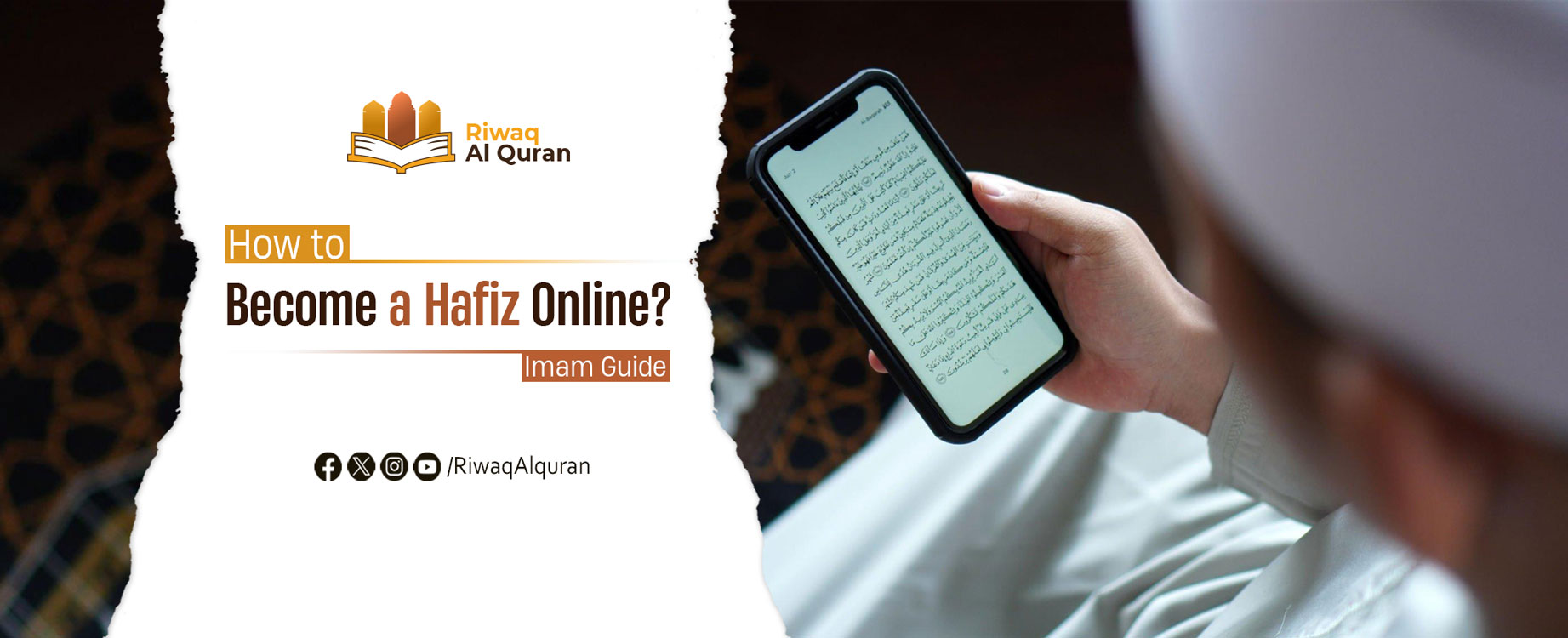Amongst the most common questions of Muslims: How can I become a hafiz? Well, that’s not the question we should be asking. The first step is to ask yourself. Why do I want to be a Hafiz? This is the right question.
Think of a father who goes to work early in the morning after trekking through rough roads. What is it that gives this man strength, motivates him, and even if he sometimes wants to quit, he gathers his strength and keeps it going? His love and responsibility towards his family are the reason for this. If he didn’t have a purpose and a reason to endure hardship for the sake of it, perhaps he would have quit his job.
Anyone can become a hafiz, but some find it a daunting task. For those who don’t know how to become a hafiz, we have developed simple steps to follow in this blog. Continue reading to learn these simple steps, rewards for a hafiz… and more!
A lot of Muslims want to learn the Quran, but they don’t know how to become a hafiz. Here are some useful instructions and tips on how to memorize the Quran much easier and faster and become a hafiz:
Table of Contents
1. Stick to a Realistic and Consistent Plan With Realistic Goals
The journey of Hifz is a marathon, not a sprint. One of the most common reasons students falter is an overly ambitious plan that becomes unsustainable. Create a realistic memorization schedule tailored to your lifestyle, capacity, and focus level.
- Set Daily and Weekly Goals: For example, aim to memorize half a page per day and review one page previously memorized.
- Track Your Progress: Use a dedicated notebook, an app, or a spreadsheet to monitor your daily achievements and track what needs revision.
- Account for Review Time: Make review a non-negotiable part of your schedule. Repetition is the mother of retention.
Consistency is superior to intensity. Even 15–30 minutes of focused memorization daily is more effective than long, irregular sessions.
Develop a structured memorization schedule that aligns with your daily routine and commitments. Consistency is key to effective memorization, so allocate dedicated time slots each day for Quranic study and revision. Set achievable goals for yourself, breaking down the memorization process into manageable tasks.
For example, aim to memorize a certain number of verses or pages each week, gradually progressing towards your goal of becoming a Hafiz.
Regularly assess your progress and adjust your approach as needed, celebrating milestones along the way to maintain motivation and momentum. Remember to prioritize quality over quantity, focusing on deep understanding and spiritual connection rather than simply accumulating memorized verses.
2. Repeat, Review, and Reinforce
The backbone of Hifz is repetition. Memorizing a verse once is never enough—what matters is how often you revisit it.
- Apply the 3R Formula: Read, Recite, Repeat.
- Daily Revision Loop: Spend time each day reviewing your recent and older memorized portions. This is where real retention is built.
- Divide and Conquer: Segment your review into recent (last 7 days), mid-term (last month), and long-term (previous Juz’).
Without a strong review system, even the most disciplined memorizer will start to forget. Make revision a pillar of your memorization plan.
3. Renew Your Intention
The foundation of becoming a Hafiz begins with niyyah (intention). This is not just about memorizing verses—it’s about internalizing the message of the Quran and transforming your heart and character.
- Why are you memorizing? Ask yourself: Is it for recognition? Or is it for the pleasure of Allah ﷻ, to seek closeness to Him, and to act upon His words?
- Ingrain the Quran into your lifestyle. Let the verses reflect in your daily actions and decisions. A Hafiz is not just one who retains the Quran in the mind but lives it through humility, truthfulness, and righteous conduct.
“Actions are judged by intentions…” – (Bukhari & Muslim)
Make a habit of renewing your intention often, especially when progress slows or distractions arise.
4. Be Disciplined and Programmed
Memorization without structure leads to inconsistency—and inconsistency is the greatest enemy of Hifz. Discipline is what transforms effort into achievement.
- Set fixed daily time slots for memorization. The most recommended time is after Fajr, when the mind is clear, and distractions are minimal. An additional effective time is before sleep, when the mind consolidates memory.
- Avoid sporadic sessions. Don’t try to memorize whenever you find time. Instead, build your day around your Hifz, not the other way around.
- Track your daily lessons and reviews using a journal or an app. This helps hold yourself accountable and see long-term progress.
Think of this like training a muscle—the more consistent you are, the stronger your memorization becomes.
Remember that the guiding light to reach any goal is stability. Hence, Avoid memorizing the Quran randomly throughout the day and find a suitable time to set aside for learning.
To attain the best results, it is recommended to start memorizing a new lesson after Fajr. It is believed to be the best part of the day to accommodate new things. Another great time to memorize the Quran is before going to bed. Research has shown studying before sleeping helps in remembering what you have learned after waking up.
5. Learn the Rules of Tajweed well
Correct pronunciation is not optional in Quran memorization—it is obligatory. Mispronouncing a letter or rule can alter the meaning of Allah’s words.
- Learn the rules of Tajweed thoroughly before or alongside memorization. This ensures you’re not just memorizing sounds but preserving the divine message accurately.
- Study under a certified Tajweed teacher who can guide you in articulation (makharij), elongation (madd), and rules of merging, stopping, and nasalization.
- Practice regularly by listening to proficient Qaris. Compare your recitation to theirs. Try mimicking tone, pauses, and articulation.
Remember, your goal is not only to store the Quran in your heart—but to recite it with reverence, as it was revealed.
Sometimes, small mistakes in pronunciation while reading the Quran can cause big changes in meaning, especially if the person does not know Arabic and it leads to memorizing words incorrectly. The best way to avoid these mistakes is to improve tajweed knowledge and apply its rules.
6. Utilize Technology Wisely:
Embrace technology to enhance your memorization process. There are numerous apps and online platforms designed to aid in Quran memorization. These apps often provide features such as audio recitations, interactive quizzes, progress tracking, and social support networks.
Additionally, consider utilizing digital flashcards or mnemonic techniques to reinforce your memory. However, ensure that your use of technology remains focused and disciplined, avoiding distractions like social media or unrelated content.
7. Create a Supportive Learning Environment And Avoid Distractions
Your environment plays a crucial role in your ability to focus, retain, and stay motivated. Set yourself up for success by intentionally crafting a space that nourishes your memorization journey.
- Designate a clean, quiet, and well-lit area specifically for Quran study. Keep it free from electronic distractions, clutter, and noise.
- Communicate your goal with your family or roommates. Let them know your schedule so they can respect your study time and even support you with encouragement and reminders.
- Build your Hifz circle. Surround yourself with peers who are also memorizing the Quran. If you can’t find one locally, join online memorization forums or groups. Sharing struggles, milestones, and tips with others can help you stay accountable and inspired.
The company you keep can either pull you closer to the Quran or further away from it. Choose wisely.
Establish a conducive environment for your Quran memorization endeavors. Minimize distractions by selecting a quiet and clean space for your study sessions. Inform your family members or roommates about your commitment to memorization, seeking their cooperation and understanding.
Surround yourself with supportive individuals who encourage and motivate your efforts. Consider joining online Quran memorization communities or forums where you can share experiences, seek advice, and receive encouragement from fellow learners.
One of the key ingredients to successful memorization is deep focus. Even a few lines a day, if learned with full attention, will go further than hurried attempts to memorize in a distracted state.
- Put your phone on silent or in another room unless it’s being used for Quran apps or audio recitation.
- Turn off notifications and unnecessary background noise.
- Choose a time when your energy and mental clarity are at their peak. For many, this is early in the morning or late at night.
- If you’re listening to an online teacher or reciter, sit attentively, away from distractions, and treat the session like an in-person class.
Focusing on the Quran is not just a mental exercise—it’s a form of adab (respect) toward the divine words of Allah.
Whether you learn one or multiple lines every day, focusing is vital! Proper learning is possible only when you can fully concentrate on your lesson. Therefore, choose a peaceful place to memorize the Quran as it will help you maintain your focus. Either you learn it yourself or listen to the online Quran recitation, sit in a quiet room, and keep your focus to achieve more.
8. Practice Active Recall and Reflection:
Engage in active learning techniques to reinforce your memorization efforts. Instead of passively reading or listening to Quranic verses, actively engage with the material through recitation, writing, and teaching. After memorizing a section, recite it aloud multiple times until you achieve fluency and accuracy.
Reflect on the meaning and significance of the verses you memorize, fostering a deeper connection with the Quran’s teachings. Additionally, periodically test yourself by reciting previously memorized passages from memory, gradually increasing the length and complexity of your recitations.
9. Use a Mushaf That You Don’t Change
Sticking to one copy of the Quran (Mushaf) helps you build a photographic memory of where verses are located on each page.
- Visual Memory Aid: Your brain associates verse locations with visual cues—left page, right page, top, bottom, etc.
- Highlight and Mark: You may use a pencil (if acceptable to you) to lightly underline or highlight words where you consistently make errors.
- Avoid Disrupting Flow: Switching between different copies or digital versions can break your visual rhythm.
The consistency of visuals helps your memory recall not just the verses but their exact position—an invaluable aid during revision and recitation.
10. Revise Regularly
Apart from memorizing a new chapter of the Quran at the start of your session, it is also important to revise what you have memorized in the past lessons. Those who don’t recite it regularly eventually forget what they have learned so far.
Prophet Muhammad (PBUH) said: “Read the Quran regularly. By the One in Whose Hand Muhammad’s soul is, it escapes from memory faster than a camel does from its tying ropes.” [Sahih Bukhari]
Keep reading and repeating the verses of the Quran that you have learned before to be stored in your mind permanently. If you skip revising the old lessons, you will eventually forget them, and there will be no point in going forward. Some revise the previous lessons daily, while others opt to do this once or twice a week.
Here is a detailed guide on how to revise Quran Hifz properly!
11. Find the Best Quran Hifz School
Even the Prophet ﷺ was taught by Jibril (AS). No Hifz journey should be undertaken in isolation.
- Correct Your Mistakes: A teacher will spot Tajweed errors and memory gaps that you might miss.
- Stay Accountable: Regular check-ins with a teacher ensure you stay on track and maintain motivation.
- Spiritual Guidance: A good teacher offers more than memorization help—they inspire, motivate, and remind you of the deeper purpose behind this noble pursuit.
Whether online or in-person, your Hifz teacher is your compass. Choose someone who is not only qualified but also compassionate and patient.
In this age of digital media, you can learn anything online. You can find different online institutes for people who wonder how to memorize the Quran with busy schedules. These institutes help people learn the Quran with certified and professional Islamic teachers in an affordable manner. Find the best Quran Hifz school and enroll yourself in the online course. Riwaq Al Quran is a pioneering institute where you can find an expert tutor to learn the Quran online from your home.
12. Understand what you learn:
Memorization without comprehension can lead to weak retention and mechanical recitation. Internalizing the meaning of the verses helps your heart connect with what your tongue is reciting.
- Read the Tafsir: Even brief summaries of the Surahs or Ayat you’re memorizing will deepen your spiritual connection.
- Use Translations: For non-Arabic speakers, reading the translation side-by-side while memorizing helps with recall and reflection.
- Relate Verses to Your Life: When possible, apply the Quranic messages to your daily situations to solidify them in both your memory and character.
This method not only enhances retention but aligns your memorization with the essence of living the Quran.
13. Learn the Arabic Language
Try to learn Arabic as it is the language of the Quran. Rather than memorizing the Quranic verses only, it is better to understand the message of the Holy Book. By learning Arabic, you will know what you are reading, like how to act by Allah’s message, what will happen on the Day of Judgment, etc.
Many people find understanding certain Arabic words helpful in remembering what comes next while reading it off by heart. Though the Arabic language is challenging, our Best Online Arabic Course will make it much easier.
14. Always Seek Allah’s Help
No matter how solid your routine, how strong your memory, or how structured your plan is—nothing succeeds without the help of Allah ﷻ. Memorizing the Quran is not just an intellectual pursuit; it’s an act of worship.
- Begin each session with duas for knowledge, such as “Rabbi zidni ilma.”
- Regularly ask Allah for:
- Ikhlas (sincerity)
- Sabr (patience)
- Thabat (steadfastness)
- Tawfiq (success)
- When you feel demotivated, lost, or face difficulty remembering a page—pause, raise your hands, and seek His help. His door is always open.
“And when My servants ask you concerning Me – indeed I am near. I respond to the supplicant when he calls upon Me.” — (Surah Al-Baqarah 2:186)
Lastly, keep making dua to the Almighty regularly to seek His help with your memorization and grace you with patience and willpower to complete this beautiful act of worship. By seeking help from Allah SWT, you will get motivated, which will help you remain determined to memorize the Quran.

How to Become a Hafiz at Home?
To become a Hafiz Quran at home, establish a consistent routine and create a supportive environment free from distractions. Dedicate specific times daily, ideally after Fajr or before bedtime, for memorization and revision. Enhance your Tajweed skills to recite accurately, and utilize technology like Quran apps or online classes for guidance.
Break down your goal into manageable portions, such as memorizing a few verses daily, and revise regularly to retain previous lessons. Seek Allah’s help through dua and stay disciplined, reflecting on the meanings to connect spiritually with the Quran. With perseverance and reliance on Allah, this sacred journey can be successfully achieved.
How Long Does It Take to Become Hafiz?
The answer to this question depends on the person who wants to be a Hafiz. Personal determination and perseverance are indeed crucial factors in becoming a Hafiz. Each individual’s journey toward memorizing the Quran is unique and influenced by various factors such as age, background, and personal circumstances. It’s essential not to compare oneself to others or be discouraged by perceived limitations.
Instead, focus on cultivating a strong will, consistency, and resilience in your memorization efforts. Embrace your strengths and weaknesses, recognizing that progress may vary from person to person. Set realistic goals and strive to surpass your expectations, rather than conforming to external standards or timelines.
Above all, maintain a positive mindset, trust in your abilities, and seek guidance and support from Allah throughout your journey. With dedication, patience, and reliance on divine assistance, you can overcome all the obstacles in your quest to become a Hafiz.
How Hard Is It to Become a Hafiz?
Becoming a Hafiz, or someone who has memorized the entire Quran, is a significant endeavor that requires dedication, discipline, and perseverance. The difficulty level varies depending on individual factors such as memory capacity, prior knowledge of Arabic, and personal commitment. For some individuals, memorizing the Quran may come more naturally, while others may find it more challenging.
The process typically involves regular memorization sessions, revision of previously memorized verses, and adherence to Tajweed rules for accurate recitation. Moreover, becoming a Hafiz is not just about memorizing the words of the Quran but also understanding its meanings and applying its teachings in daily life. This requires a deep spiritual connection to the Quran and a commitment to living by its principles.
While becoming a Hafiz is undoubtedly challenging, many individuals have successfully achieved this milestone through dedication, support from knowledgeable teachers, and reliance on the blessings and guidance of Allah. With determination and perseverance, it is possible to become a Hafiz, and the spiritual rewards of this achievement are immense.
How Can I Become a Hafiz in 1 Year?
Many Muslims want to know how to become a hafiz in 1 year. To become a Hafiz in one year, establish a daily routine focused on consistent memorization and revision. Begin by assessing your current memorization level and setting realistic goals for daily progress. Allocate specific time slots each day for memorization sessions, starting with manageable sections of the Quran and gradually increasing the length as you become more proficient.
Also, prioritize regular revision to reinforce memorized verses and prevent forgetting. Stay flexible and adaptable, adjusting your plan based on your progress and any challenges you encounter. Seek guidance from qualified teachers or programs and find support in online communities or study groups. With dedication, perseverance, and reliance on Allah, achieving your goal is attainable.
Become a Hafiz in 56 Days!
If you aim to memorize the Quran within a short time frame, it is crucial to have an advanced understanding of Tajweed to avoid pronunciation challenges and optimize your time. Additionally, your memorization skills must be strong. Each day’s memorization should be carefully divided across specific times, with a disciplined approach ensuring consistency. Also, having a dedicated teacher is essential for guidance and accountability, whether through a structured program, camp, or online instruction.
While memorizing the Quran in 1 year is feasible, success depends on one’s memory, time commitment, and effort. To achieve this goal, it’s necessary to prioritize Quranic memorization over other activities. Similar principles apply to shorter timeframes, such as memorizing the Quran in 30 days, or 56 days, or becoming a Hafiz in 6 months, with the time frame varying based on individual memorization abilities and dedication. Adjusting the daily verse count and scheduling accordingly can expedite the memorization process.
Dua to Become Hafiz
It cannot be said that there is a specific dua to become Hafiz, but with the advice of our Prophet and duas, help can be asked from Allah. Also, plenty of verses and supplications can be recited to increase knowledge.
It has been reported that the Messenger of Allah (PBUH) often used to say: “O Allah, benefit me by that which you have taught me, and teach me that will benefit me, and increase me in knowledge. Praise is to Allah in all situations, and I seek refuge with Allah from the torment of the Fire.” [Sunan Ibn Majah]
Other duas to say to get Allah’s help in increasing knowledge are as follows:
- “O, Allah, I ask You for knowledge that is of benefit, a good provision, and deeds that will be accepted.” [Ibn As-Sunni]
- “O, Allah! Make easy for me every difficult thing, with Your special favor and Kindness, for it is easy for You to make every difficult thing easy.”
- “…My Lord, expand [i.e., relax] for me my breast [with assurance]. And ease for me my task. And remove the impediment from my tongue. So, people may understand my speech” (Taha: 25-28)


Become a Quran Hafiz at Home:
In this article, we have compiled useful tips about Hifdh for you. InshaAllah, with what we read and what is written in our hearts, we will be among the most beautiful travelers in the sight of Allah and pass the path of life.
We would like to be your companion on this journey and help you do Hifz at home easily. For an effective and permanent Hifdh, enroll in our special Quran Memorization Course. Make your Hifz journey effective and permanent with our experienced tutors and contact us now!




































